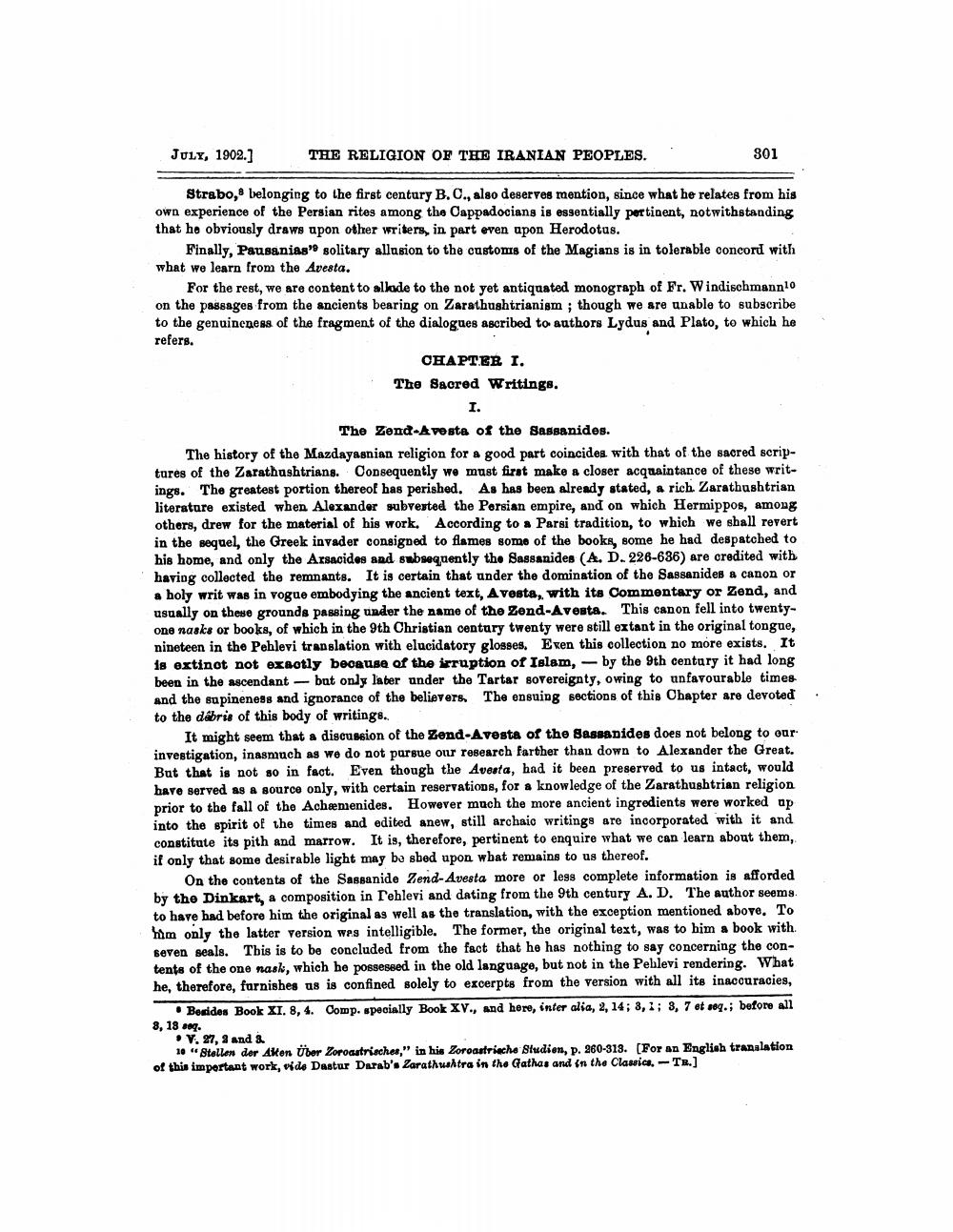________________
JULY, 1902.]
THE RELIGION OF THE IRANIAN PEOPLES.
301
Strabo, belonging to the first century B.C., also deserves mention, since what he relates from his own experience of the Persian rites among the Cappadocians is essentially pertinent, notwithstanding that ho obviously draws upon other writers, in part even apon Herodotus.
Finally, Pausanias' solitary allusion to the customs of the Magians is in tolerable concord with what we learn from the Avesta.
For the rest, we are content to sllade to the not yet antiquated monograph of Fr. Windischmann10 on the passages from the ancients bearing on Zarathushtrianism ; though we are unable to subscribe to the genuineness of the fragment of the dialogues ascribed to authors Lydus and Plato, to which he refers.
CHAPTER I. The Sacred Writings.
I.
The Zend Avaste of the Bassanides. The history of the Mazdayasnian religion for a good part coincides with that of the sacred scriptures of the Zarathashtrians. Consequently we must first make a closer acquaintance of these writings. The greatest portion thereof has perished. As has been already stated, a rich Zarathushtrian literature existed when Alexander subvested the Persian empire, and on which Hermippos, among othors, drew for the material of his work. According to a Parsi tradition, to which we shall revert in the sequel, the Greek invader consigned to flames some of the books, some he had despatched to his home, and only the Arsacides and subsequently the Sassanides (A, D. 226-636) are credited with having collected the remnants. It is certain that under the domination of the Sassanides a canon or a holy writ was in vogue embodying the ancient text, Avesta, with its Commentary or Zend, and usually on these grounds passing under the name of the Zond-Avesta. This canon fell into twentyone nasks or books, of which in the 9th Christian century twenty were still extant in the original tongue, nineteen in the Pehlevi translation with elucidatory glosses. Even this collection no more exists. It 18 extinct not exactly because of the irruption of Islam, - by the 9th century it had long been in the ascendant - but only laber under the Tartar sovereignty, owing to unfavourable times and the supineness and ignorance of the believers. The ensuing sections of this Chapter are devoted to the debris of this body of writings.
It might seem that a discussion of the Zend-Avesta of the Sassapides does not belong to our investigation, inasmuch as we do not pursue our research farther than down to Alexander the Great. But that is not so in fact. Even though the Avesta, had it been preserved to us intact, would have served as a source only, with certain reservations, for a knowledge of the Zarathushtrian religion prior to the fall of the Achæmenides. However mach the more ancient ingredients were worked up into the spirit of the times and edited anew, still archaic writings are incorporated with it and constitute its pith and marrow. It is, therefore, pertinent to enquire what we can learn about them, if only that some desirable light may ba sbed upon wbat remains to us thereof.
On the contents of the Sabbanide Zend-Avesta more or less complete information is afforded by the Dinkart, a composition in Pehlevi and dating from the 9th century A. D. The author seems to have had before him the original as well as the translation, with the exception mentioned above. To him only the latter version wes intelligible. The former, the original text, was to him a book with seven seals. This is to be concluded from the fact that he has nothing to say concerning the contents of the one nask, which he possessed in the old language, but not in the Peblevi rendering. What he, therefore, furnishes us is confined solely to excerpts from the version with all ite inaccuracies,
Besides Book XI. 8, 4. Comp. specially Book XV., and here, inter alia, 2, 14; 3, ; 3, 7 et seq.; before all 8,13 -0.
• V. 27, and &
10 "Stellen der Akten Über Zoroastrisches," in his Zoroastriache Studien, p. 260-318. (For an English translation of this important work, vide Dastur Darab's Zarathustra in the Gathas and in the Classico.-T.]




